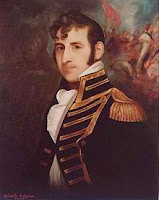This month marks the 210th anniversary of the first "Special Warfare" Operation conducted by the United States Navy.
Early in Thomas Jefferson's presidency, he saw little utility in the United States having expeditionary warfare capability or a blue water navy. In fact, Jefferson thought the existence of either would invite war instead of preventing it. But the fledgling Navy was already on station in the Mediterranean and its leadership was determined to prove the new president wrong – and in time, it would.
At the turn of the 19th century, pirates backed by tribal leaders and warlords controlled the maritime approaches from the Atlantic Ocean into the Med and the North African littorals. It was customary for European navies to pay "tribute" to these sea-going thugs in order to guarantee safe passage – a custom that the American Navy refused to abide by because it violated international law (and it lacked the resources to pay). As a result, the United States found itself at war with the Barbary States, today known as Libya.
In October of 1803, the American warship Philadelphia was patrolling near the African coast when it ran aground on an uncharted reef. The ship was captured by the Tripolitans and the crew members were imprisoned. The loss of this combatant vessel seriously reduced the U.S. Navy's Mediterranean force and had the potential to increase the enemy's seagoing offensive power.
Ultimately, Tripoli lacked the resources needed to operate the captured frigate, but that wasn't obvious to the Americans, so Commodore Edward Preble began planning a contingency operation to eliminate the emerging threat. The idea of recapturing the Philadelphia in Tripoli's well-fortified harbor was ruled undoable, but her destruction – by burning – appeared feasible. Heavy losses were possible but deemed acceptable, considering the importance of the mission.
 |
| Lt Stephen Decatur |
With a crew taken from Enterprise and the flagship Constitution (old Ironsides) plus a Sicilian pilot who was familiar with Tripoli harbor, Decatur sailed from Syracuse on February 3, 1804. Storms kept Intrepid at sea for nearly two weeks and her crew was forced to endure crowded conditions, poor food, and generally filthy surroundings.
Finally arriving after the hard passage, Decatur and his crew of volunteers slipped into Tripoli harbor. The brash lieutenant kept all but a few of his men below decks to maintain Intrepid's appearance as a local trading vessel. They sailed along slowly and, claiming to have lost the ship's anchors, requested permission to tie up alongside the Philadelphia. Their request was granted.
But the ruse was unveiled as the two vessels came close and an alarm cry rang out. Decatur immediately ordered his men to board, and the sailors' swift action gave the enemy guards no time to organize resistance. Most of the guards jumped overboard and swam ashore Those that stayed to fight were cut down in a short and bloody action, while the American raiders prepared to burn their prize.
Less than twenty minutes later, Philadelphia was blazing brightly. Casting off just ahead of the flames, the Intrepid's men rowed out of the now well-lighted harbor under intense musketry and cannon fire. The operation was a complete success: The Philadelphia burned to the waterline and sank; none of the raiders was killed and only one was injured.
Decatur's actions that day and throughout his career saw him to rise to the rank of commodore and made him a national hero and celebrity (and one of my personal hero's). But the same sense of honor that informed his courage and leadership later proved to be his undoing. He was mortally wounded in a duel with fellow Navy officer James Barron over an official court martial finding as a result of Barron's conduct in battle. The wounded Decatur was taken from the duelling ground in Maryland to his home in Washington D.C., where he died 12 hours later surrounded by his family and congressmen who rushed from the Capitol to his side after hearing of the shooting.
Naval historians are divided on where Decatur fits among the nation's seagoing heroes, and in many ways he is hidden in the long shadow cast by the "father of the American Navy," John Paul Jones. But 210 years ago today, Decatur led what British Admiral Horatio Lord Nelson called "the most bold and daring act of the age" – high praise indeed from the master of naval warfare -and an act which helped establish the reputation of the United States Navy as a fighting force to be respected.
Today's Reflection:
"-To her we drink; for her we pray; Our voices silent never; For her we'll fight, come what may; The Stars and Stripes Forever!"
-Stephen Decature
Live Long and Prosper...



No comments:
Post a Comment